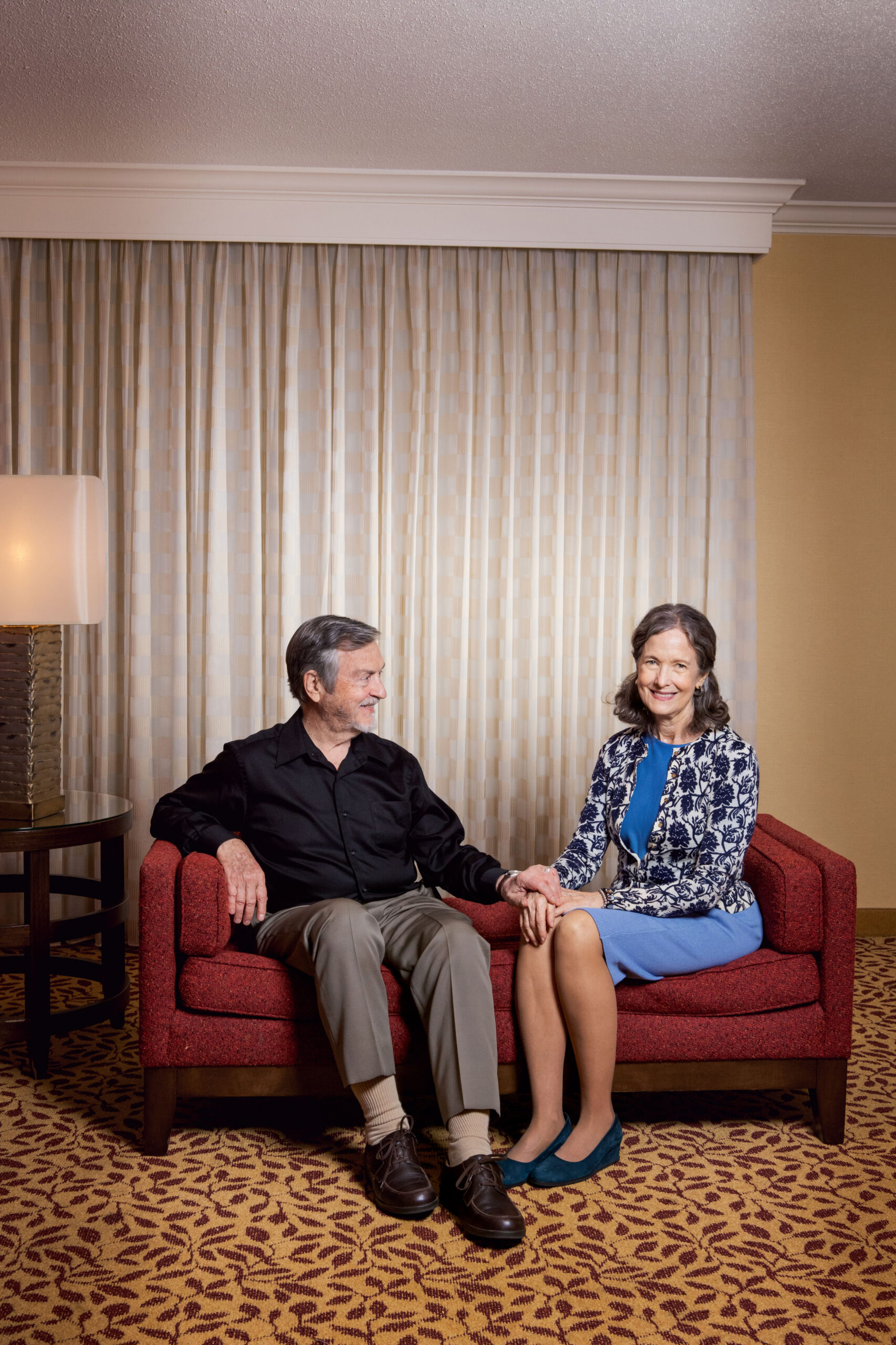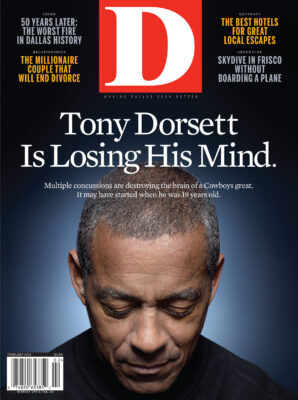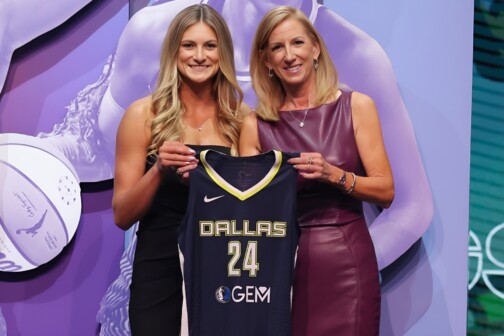Harville and Helen, speaking into microphones, start the workshop by asking the couples to check the batteries in their headsets. The translations are coming live from a booth in the back of the cafeteria, a setup Harville compares to the United Nations. Then Harville and Helen both stop and gaze at the audience. They turn back and forth, and nod like they’re sizing something up.
“I think I know what kind of group we have here,” Harville says to his wife.
“I do, too,” she says. Then they play-debate whether they should tell us what they’re thinking.
The tone is strange, rehearsed. Tara and I look at each other the way we do when we realize we’re both picking up on something odd.
Then, together, Harville and Helen point at the crowd, raise their voices, and announce with stunning enthusiasm: “You are amazing!”
It’s so uncomfortable we can’t help but giggle. They repeat it, together: “You are amazing!”
I can see Tara’s eyes getting wide, a look of dismay, confusion, bemusement.
Helen and Harville ask all the couples to stand up and say it with them: “You are amazing!”
“Turn and say it to your partner!” Harville says. “You are amazing!”
Tara and I stand and say it. “You are amazing!” It takes an effort not to sound a little sarcastic.
“At the top of your voice!” Harville says. “You are amazing!”

When that’s over, Harville and Helen take turns talking and clicking through a PowerPoint that includes slides in both English and Spanish. Helen explains that half the people here tonight are the “draggers,” the other half are the “draggees,” and that it will actually be that second group that’s more excited by the end of the workshop. “See,” she says. “Your partner already decided that you’re the problem.”
Harville goes over what couples generally want from a relationship, which he boils down to: safety, a connected feeling, and joy. Helen explains that even if we forget everything else, they hope we remember three things. One idea: that childhood influences marriages. One skill: the ability to have safe conversations. One decision: a commitment to zero negativity.
We both bristle a bit at that last one.
•••
In an effort to demonstrate how childhood can affect an adult marriage, Helen tells the group a bit of her own story.
“Has anyone seen the show Dallas?” she says. “If you’ve seen that, then I don’t need to tell you about my family.” In this largely immigrant audience, though, there aren’t many nods.
She speaks in vague terms. She doesn’t say her father’s name, but she explains he was an oilman. She says her mother was very involved with the church. Her father could be a “dictator,” she says. Because he didn’t like television, nobody in the house was allowed to watch television. (Except
the show Father Knows Best, of course.) Women weren’t allowed to touch money in her family, and Helen was told she needed to marry a businessman or a lawyer. Once she was married, her husband was always distracted by the family business. Eventually, she says, “he broke the law and caused a lot of problems and brought a lot of shame to the family.” They divorced, and he left the country.
She was sad after the divorce. She was introduced to Harville at a party. He, too, had recently divorced, and they each had two kids from their previous relationships. He was teaching at SMU, and trying to figure out why relationships fail. He seemed so nice compared to other men in her life. When they went on dates, he asked where she wanted to eat. When they went to the movies, he asked what she wanted to see.
But after they got married, Helen says, Harville changed.
“He tricked me,” she says with a smile. “I stayed the same.”
While he was working on his book, she made lists of things he should do differently. She wanted to help him with his social graces, how to dress, how to tell jokes, how to be a better parent.
“Here I was giving free advice,” she says. “I wasn’t even going to charge him, just out of the kindness of my heart.”
He pulled away, focusing more on his work and less on his wife. And they began to repeat the patterns of her first marriage. A student of psychology herself, she wondered if it wasn’t something subconscious making this happen. A wound from childhood perhaps. That, she says, is why it’s helpful to shine a light on the past, with safe conversations.
“Wait,” Tara says to me under her breath. “They wrote a book about relationships before they even had a good relationship?”
Harville and Helen explain to the group that it’s important to truly listen to your partner, and not just take turns talking. And to remove all negativity, which Harville defines as “anything that your partner perceives as negative.” (When you perceive something negative, you let your partner know by saying “ouch.”) Instead of something negative, they suggest “sharing an appreciation.” Then they recommend that every couple sign a pledge to remove negativity for 30 days. It comes with a calendar and a set of smiley and frown-y stickers.
Tara sighs. “When you sign it, I sign it,” she says.
Then she sees me writing that down. “Oh, come on!” she says. “You’re going to make me look terrible in this aren’t you?”
They ask for volunteers for the first demonstration of a safe conversation. Eventually Gail and Jim, one of the only other white couples in attendance, raise their hands. He’s wearing a tan polo, and she’s wearing a denim shirt with a sweater. They’re invited to sit in the middle of the room, very close to one another, with Harville seated inches away. He suggests the couples in the audience follow along with the dialogue exercise in their workbooks.
The safe conversation begins with one partner “making an appointment”—asking if it’s a good time to talk. Then the couple is supposed to sit and maintain eye contact while taking several deep breaths, “connecting nonverbally.” Harville suggests looking at your partner’s pupil. If the pupil is large and open, your partner is relaxed and ready to talk. If the pupil is small, like a cat’s, “you’re probably gonna get scratched.”
As Gail and Jim share their appreciations, some women in the room lean in. It feels a little like watching a soap opera or a reality show. As Jim struggles to repeat exactly what Gail says, mirroring to help her feel understood, the audience winces and laughs. But once the couple starts talking about their childhoods—once Gail mentions that she didn’t always feel safe as a kid—the tone changes. Both husband and wife seem to transform right in front of our eyes. There’s no more laughing. Harville tells the couple to stand up and give each other a one-minute, full-body hug. The audience claps.
When they’ve both opened and sufficiently salved vague wounds from the past, it’s our turn. Every couple turns their chairs to face one another and opens to the page in the workbook with the dialogue exercise. Because we can’t read our books, we try to wing it from memory.
Both husband and wife seem to transform right in front of our eyes. There’s no more laughing. Harville tells the couple to stand up and give each other a one-minute, full-body hug. The audience claps.
tells me that she appreciates my intelligence and my smile and that I often cook for her or pick up food from restaurants she likes. I tell her I appreciate that she’s smart and beautiful, that she keeps the house remarkably clean and that she does the vast majority of the shopping. I say I appreciate that she’s funny and a good mom to our pets, and supportive enough of me to even be doing this right now. Then we both share appreciations that we wouldn’t want our parents reading about.
Because we aren’t using the workbooks, and because we are having so much fun sharing our adult-themed appreciations, we forget to do the second part, the connection to our childhoods. But it’s immediately apparent the other couples in the room didn’t forget this step.
Tara looks up, and her expression changes. I turn around and realize that while we had been giggling, nearly everyone else in the room was crying.
•••
The next morning is cold and damp, and Tara isn’t happy to be out of bed. She tells me it reminds her of when she had to be up early on Saturdays as a kid, something she always hated. She still complains about when her mom signed her up for soccer.
A table by the entrance has coffee, orange juice, and big pink boxes full of Mexican pastries. There are noticeably fewer people here than there were last night. The guy I saw texting while Jim appreciated Gail is gone. The woman who was in clubbing clothes is here though, wearing a conservative sweater. Each time we see a couple come in late, Tara and I quietly wonder if they’ve been fighting. (We have some experience with that sort of thing.)
Before we left last night, Helen told everyone that the homework assignment was to share three appreciations each with their partner before they went to bed. We were planning on it. I even had some appreciations I’d been plotting out in my head. But then we fell asleep. Now we both feel kind of bad.
Helen asks if anyone would like to share their experience. A woman stands up and, in broken English, explains that last night was the first time she’s ever felt like someone was really listening to her. A man on the other side of the room stands up and explains that he had never before in his life been told he was appreciated.
Then Harville begins a short lecture about the dyadic nature of the universe, how everything is partnered, connected. We breathe, and trees turn that back into oxygen, he says. Every particle in the universe has another particle out there that complements it. He points out that many creation stories are partner-based, from Adam and Eve to Hermaphroditus to the concept of yin-yang.
Helen takes over for a very condensed history of modern psychology, from Freud to neuroplasticity—the idea that we can change our brain chemistry. With her sweet voice, she sounds like she’s delivering news that a long war is finally over. “The thoughts you run through your brain can change the way you feel,” she says. “Wanna be angry? Think of something angering. Wanna be joyful? Think of something joyful. Your brain releases different chemicals.”
I notice Tara is drawing an impressive doodle on our new workbooks. (They had some in English by the morning.) She’s paying attention, too, though. She even catches a typo on a PowerPoint slide.
Soon Helen picks up where she left off on the story of their life together. In the early ’80s, Harville lost his job teaching pastoral counseling at SMU because he still hadn’t published a book. But he was dedicated to researching why couples fight, and in 1988, he finally published Getting the Love You Want. Not long after it was released, he got a call from a producer at Oprah Winfrey’s show. This audience may not have recognized Dallas, but they certainly recognize Oprah.
The book became a bestseller, eventually moving more than three million copies and bringing Harville adulation and an endless list of speaking engagements. Oprah submitted the episode with Harville and won her first Emmy. He became a regular on her show, and she started referring to him as “the relationship whisperer.” As he got busier and more distant, the relationship grew tense. There were more fights.
“We can’t be famous marriage counselors and fight every day,” Helen would tell him. She’d read to him from his own book, and remind him loudly, “You wrote this!”
“Oh, that made me so mad!” Harville says.
They started going to therapy, but, as Helen says, “Are we going to let someone else tell us what’s wrong?” They got rid of therapists one, two, three, and four. Number five got rid of them, calling them, “the couple from hell.” Helen says they were on the verge of divorce when she was reading a psychology book one day. She put it down and rushed to tell Harville: “We don’t have to get divorced! We just need brain surgery.”
At this point in the workshop, Harville describes what psychologists call the “Still Face” experiment. There’s a video. First, a mother stands in front of her baby, making an overly expressive face. She’s smiling, engaged, reacting when the baby points. The baby is happy. In the second video, the mother looks directly at the baby with an expressionless, still face. The baby tries to engage again, and when it doesn’t happen, the baby gets upset very quickly. (The researchers stopped the experiment early because they didn’t know what kind of possible permanent damage they might be inflicting.)
This disconnecting moment, something Harville says we all face at some point, he calls “the rupture of joy.” Most of us never find that kind of joy again, he tells us. That creates both a longing and a loss of empathy.
No matter how great your parents were, every human has some unmet needs from childhood, needs your partner seems to meet, at least initially. But nobody can meet all of a partner’s needs all the time. Sometimes life gets in the way. And sometimes, there’s another disconnect that can become stressful, Harville explains, like the baby in the “Still Face” experiment.
This all sounds rather pseudoscience-y to us. But then Helen asks people to share, and a woman near us stands up and tells a story about needing approval. She’s in her early 30s. Her father wasn’t around much and never gave her much validation, she says. She and her husband have a business together, and he hasn’t been able to give her the sense of approval she craves. She just realized that’s why she’s been doing her son’s homework. As she talks, she stares vacantly at the floor and tiny tears roll off her cheeks. She knows it sounds silly, she says, and it’s probably hurting him, but when she gets the grades back it makes her feel good.
She takes a deep breath and looks around. “I hope none of his teachers are here.”
We do an exercise meant to help us uncover what kind of childhood wounds we experienced and what kind of needs may not have been met. We are each supposed to share a childhood experience that made us feel either controlled or neglected and link it to a need we have as an adult.
I tell Tara about how there were a lot of times when my mother had to work and I felt alone. Sometimes it made me feel like I was different, like an outsider. I tell Tara that I appreciate that she is available for me, that she makes me feel accepted. As soon as I begin connecting the feelings I had when I was young with the feelings I have now, the conversation gets more serious. We aren’t laughing this time.
Tara tells me that at times she worries about disappointing her parents. She knows her father wanted her to go to law school, and she could have gone, so she feels like she may have let him down. Her tone changes. She’ll probably deny it later, but as she’s sharing, rekindling those childhood emotions, her eyes get just a bit glassy. I can see a little girl who wants so badly not to disappoint.
I thank her for sharing, and she thanks me for listening. Then we stand up, and I give her a long hug.
•••
For lunch, there are tostadas. Tara and I take a walk around the school. As we look at the trophy cases and bulletin boards and the purple Vikings logo painted on the walls, we discuss some of the pros and cons of bringing a child into this world. We agree that so much of life would be easier if everyone thought about each other’s needs, if all communication were calm and considerate.
After lunch, Helen tells us to think of our relationships like gardens. You don’t yell at a garden, she says, because that won’t help the tomatoes grow. First you have to weed it. That’s removing the negativity. Then you water it and fertilize it, and in time, it feeds you.
“You don’t hurt someone to get what you want,” Harville says. That’s the point of the zero-negativity challenge.
Helen says she used to vent all the time. She thought she was decompressing. But in reality, she says, she was “just reinforcing the wrong neural pathways.” That’s why they strongly recommend people not create lists of things they dislike about their partners. They suggest creating a list of caring behaviors that make you feel good instead. It means a lot to Harville when Helen makes an effort not to interrupt him when he’s in his office watching Star Trek, for example.
We’re asked to tell our partners about some specific caring behaviors that make us feel loved and cared about. I tell Tara I feel loved when she helps me with my stories, and when she protects my writing time, and when we go for walks together. She tells me she feels loved when I support her endeavors, whether she’s researching ancient legends or raising chickens or living as a vegan.
Harville suggests everyone should surprise their partners now and then with a caring behavior. Surprises create endorphins, he explains. “Not more than once a month though,” he says, “or it levels out.” He tells us to pay attention if our partner is dropping hints about what they’d like for a surprise.
They say we should make an effort to have what they call “high-energy fun” together. This, Harville explains, can be belly laughs, or orgasms, “or preferably both at the same time.” He pauses for a moment after that last remark, smiling. “Was there a problem with the translation?”
Soon they have us all stand up and practice big, contrived belly laughs. It’s so strange and disarming that the fake guffawing soon leads to genuine laughter. With everyone cackling, the room briefly looks like an insane asylum.
Then comes the flooding exercise. One partner sits still while the other walks in circles, “flooding” them with compliments and kind words at ever-increasing volumes. It culminates with the flooder jumping up and down and yelling “I love you!” over and over as loudly as possible.
Before the workshop is over, they hand out teal wristbands with ZN CHALLENGE on them. They pass out the Zero Negativity calendars. Harville and Helen both reiterate their idea to change the world: healthy couples, healthy kids, a better place to live. They tell the couples to share the safe conversation skills they’ve learned, and to spread the word about upcoming workshops.
There are at least two more already scheduled, including one on Valentine’s Day when they expect more than 500 couples to participate. Much of the Safe Conversations initiative is still being created, but they’d like Dallas Mayor Mike Rawlings to make their push part of his campaign against domestic violence. Harville and Helen are also in the process of establishing a home in Dallas, and are working with researchers at SMU to track these families and the city’s joy index.
At the end of the workshop, there’s music and a conga line snaking through the cafeteria. Dozens of couples line up to talk to Harville and Helen, to thank them and even have their picture taken together. Couples who were sullen and quiet when they showed up are now smiling, happy, holding hands while walking to their cars.
Do I think this will bring about world peace? Probably not, but after seeing the emotional releases, the realizations, the transformations, Tara and I agreed that a lot of couples we know could benefit from a workshop like this.
After a few weeks, it’s safe to say that weekend didn’t really change our relationship much. Neither of us wore our teal wristbands long. We haven’t made much use of the calendar or the smiley-face stickers. But we have been making an effort to be less negative. (We decided it’s a nice ideal to strive for, like world peace.) And we try to surprise each other. And we’ve found that thinking of your partner’s needs—and the wounded child inside—does make it easier not to fight.
Plus, I’ve taken to turning to her periodically, looking her in the eyes, and telling her: “You are amazing!”





